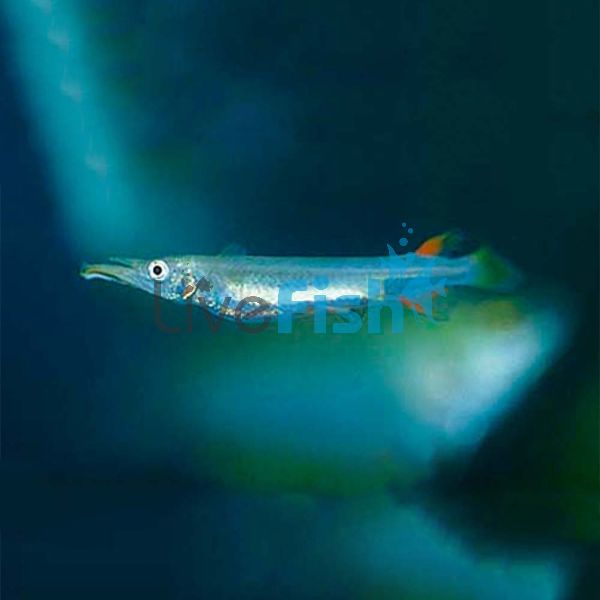Half Beak 4cm
Halfbeaks are an incredibly underrated oddball nano fish, that are hardy, relatively peaceful, and a unique-looking species. They have a very close resemblance to the monster-sized garfish but only grow to a maximum size of 7 cm which makes them a perfect fish for smaller, tropical aquariums. Half beaks are also commonly known as wrestling half beaks as males tend to display a dominant display with each other. Historically these fish have been used in fighting competitions much like bettas have been where 2 males will be placed together to ‘wrestle’.
- Buy 5 for $11.98 each and save 10%
- Buy 15 for $11.31 each and save 15%
- Buy 20 for $10.65 each and save 20%
Half Beak
Halfbeaks are an incredibly underrated oddball nano fish, that are hardy, relatively peaceful, and a unique-looking species. They have a very close resemblance to the monster-sized garfish but only grow to a maximum size of 7 cm which makes them a perfect fish for smaller, tropical aquariums. Half beaks are also commonly known as wrestling half beaks as males tend to display a dominant display with each other. Historically these fish have been used in fighting competitions much like bettas have been where 2 males will be placed together to ‘wrestle’.
Half beaks get their name from their characteristic beak-like mouth that sports a major underbite. These fish have very thin, slender bodies almost looking like a toothpick in the water as they glide near the surface. The body colour of these fish is a sandy brown colour which is quite dark near the belly region. They also have bright yellow highlights on the beak and tail fin, near these fins there is also a streak of bright red for additional contrast. Their dorsal fin is really far back on their body which really accentuates their lengthy body shape which then leads to the rounded tail fin. These are also great considerations for a brackish water aquarium as well.
Halfbeaks are relatively easy to fish to breed in captivity as they are livebearers like guppies or mollies. Differentiating males and females is also quite easy as much like guppies these fish sport a gonopodium which is used for breeding. After around 3-8 weeks of gestation, the female will release fully formed young into the aquarium. There have been reports that after 2-3 breeding cycles, females tend to become quite weak due to a potential nutrient deficiency which is why, if you do intend on breeding these fish extensively it is best to feed them with high-quality food.
Tank Recommendations for your Half Beaks
Being a very small and easy to care for fish the golden half-beak can be kept in smaller aquariums with the minimum being a 70-liter system. These fish are mostly top dwelling and will appreciate a longer tank to supplement their active behavior. A tight-fitting lid is also required because the gold half-beaks have a high risk of jumping out. Though the hardscape and substrate are not a major concern, the gold half-beak will love a planted tank.
Suitable Tank Buddies
Half beaks are a relatively peaceful fish however males can show dominant displays with one another which is why it is best to keep them in a group of 6 or more. Half beaks may potentially prey on smaller fish so this should be taken into consideration.
Usually Compatible
Paradise fish, sparkling gourami, bristlenose plecos, corydoras,s and a range of other peaceful community fish that stay over 5 cm.
Sometimes Compatible
Larger community fish such as giant danio or angelfish do have the ability to outcompete the generally slow half-beak.
Rarely Compatible
It is best to avoid neon tetras and nano species like endlers as these have a high chance of getting preyed on by the half-beaks. Large and aggressive species would prey on the half-beaks such as oscars, or jaguar cichlids.
Feeding your Half Beak
The Halfbeak is very easy to feed once it is settled into the aquarium. They will readily eat a wide range of foods but would prefer to have high-protein foods like frozen bloodworms, Mysis shrimp, or live foods such as brine shrimp or black worms. This however can be easily substituted with good-quality flakes or nano-floating pellets.
| Scientific Name | Dermogenys Pusilla |
|---|---|
| Care Level | Moderate |
| Common Names | Half Beak, Wrestling Half Beak |
| Diet | Omnivore |
| Fish Family | Zenarchopteridae |
| Lifespan (years) | 4 |
| Max. Length (cm) | 7 |
| Min. Tank Volume (l) | 70 Liters |
| Origin | Indonesia |
| Reef Safe | Yes |
| Sociability | Peaceful |
| Venomous | No |
| Water Conditions | 24-28° C, pH 7.0-8.0 |




